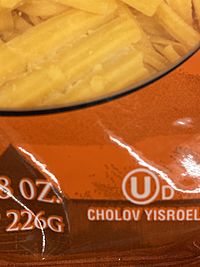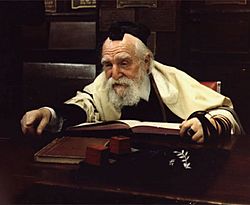Chalav Yisrael facts for kids

A package of chalav Yisrael–certified cheese
|
|
| Halakhic texts relating to this article | |
|---|---|
| Mishnah: | Avodah Zarah chapter 2, Mishnah 6 |
| Babylonian Talmud: | Avodah Zarah 35b, 39b |
| Shulchan Aruch: | Yoreh De'ah 115:1 |
Chalav Yisrael, also called cholov Yisroel, is a special kind of milk that follows Jewish dietary laws. It means "Jewish milk." For milk to be chalav Yisrael, a Jewish person who follows the rules must watch the milking process. This rule, called halakha, started a long time ago. It is mentioned in the Talmud, which is a collection of Jewish teachings. The main reason for this rule was to make sure that milk from a non-kosher animal (like a camel) was not mixed with milk from a kosher animal (like a cow).
Today, some Jews follow this rule very strictly. Others rely on a famous Jewish leader named Rav Moshe Feinstein. He said that in countries like the United States, there are strict laws against mixing different types of milk. Because of these laws, he believed it was safe to assume the milk was kosher, even if a Jew didn't watch the milking.
What Makes Milk Kosher?
According to Jewish law, milk is only considered kosher if it comes from a kosher animal. For milk, this usually means cows, goats, and sheep. These animals are kosher.
Milk from animals that are not kosher, like horses or camels, is never kosher. This is true even if the milk is pure.
Why the Chalav Yisrael Rule Started
Long ago, during the time of the rabbis who wrote the Talmud, Jewish wise people called Chazal made a rule. They said that milk could only be used if a Torah-observant Jew watched the milking. Or, a Jew had to supervise the milking.
This rule is written in a part of the Mishnah called Avodah Zarah. The rule was made because people worried that a non-Jewish person might mix milk from a non-kosher animal into the kosher milk. Milk that was not watched by a Jew became known as "chalav akum." This means "milk of a non-Jew." Milk that was properly watched became known as "chalav Yisrael." This means "Jewish milk."
Later, this idea was discussed more in the Talmud. The rabbis talked about whether the rule was still needed. They thought about ways to know if milk came from a non-kosher animal. But in the end, they decided to keep the rule.
Important Jewish law books later wrote down this rule. One was Mishneh Torah by Maimonides. Another was the Shulchan Aruch by Rabbi Joseph Karo. Today, chalav Yisrael milk is watched by a mashgiach. This is a kosher supervisor. The mashgiach needs to be there when the milking starts. They also make sure the milk stays kosher until it leaves the farm or factory.
The chalav Yisrael rule also comes up with kosher cheese. Some people think that since non-kosher animal milk can't be used to make cheese, it might be okay to eat cheese that isn't chalav Yisrael. However, the Jewish sages also made a rule against eating cheese made by a non-Jew (called gevinat akum). So, most people who keep kosher only eat chalav Yisrael cheese.
Chalav Stam
The term chalav stam means "plain milk." This refers to milk that is considered kosher even if a Jew did not watch the milking. The most famous permission for this came from Rav Moshe Feinstein. He wrote about it in his book Igros Moshe.
Rav Moshe said that in places like the United States, there are strict government laws. These laws stop companies from mixing different types of milk. Because of these laws, he believed it was safe to trust that the milk was pure. It was like a Jew had watched it. This ruling is accepted by many, including the Orthodox Union in the European Union and other countries. But it is not accepted where laws are not strictly followed.
However, many Jews, including Rav Moshe himself, prefer to only use chalav Yisrael milk. This means milk that a Jew actually saw being milked. The Hasidic Chabad movement also believes this. They say that if chalav Yisrael is easy to find, it's better to use it. In recent years, more and more Orthodox Jews are choosing chalav Yisrael products.
There is also a discussion about food cooked on equipment that was used for non-chalav Yisrael products. Some people say it's okay if the equipment is clean. Others say it's not.
 | Charles R. Drew |
 | Benjamin Banneker |
 | Jane C. Wright |
 | Roger Arliner Young |


